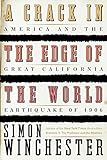
Fantastic book, as usual, from Winchester. 3 main story lines: (1) how plate tectonics work, with particular attention on our lovely left coast, (2) the history of San Francisco, and (3) a recounting of the events of April 18, 1906 (great picture of City Hall at that link).
And forgive me for the long excerpt, but here’s my favorite bit, relevant today for so many different reasons:
Seldom does an entire and very large urban community fall victim to utter disaster. Most great catastrophes tend to be relatively local — an explosion will devastate an awesome number of city blocks here, a fire will wreck a neighborhood there, a flood will inundate the lower-lying parts of a town, terrorists will wreak mayhem in a crowded urban quarter. But once in a mercifully rare while there are those events that enfold and ruin in full the complex engine work that is an established, fully developed urban society. The dropping of the atomic bombs on Hiroshima and Nagasaki are among the most obvious. The Great Fire of London in 1666. The Black Death. The wartime destruction of Berlin and Dresden. the volcanic ruin of Santorini, of Pompeii and Herculaneum, and Merinique’s St. Piere. The huge eatrhquakes in Lisbon and Tangshan — and then, in 1906, in San Francisco.
the biggest of these cities survived. The smaller communities — Pompeii and St. Pierre, for example — lost their raison d’etre once their buildings were gone, once their monuments were buried and their byways obliterated. but the world’s big cities generally exist for reasons that go far beyond the accumulation of buildings that is their outward manifestation. Their presence in the place they occupy is invariably due to come combination of geography – they lie by a river crossing, in a bay of refuge, at the mouth of a mountain pass — and of climate, together with some vague and indefinable organic reason that persuades humankind to settle there.
Trials of any kind — war, pestilence, natural or human violence, with wholesale death or total physical destruction, or both, being the harshest of all — may slow that growth or cause some other setback; but such things are just setbacks, and before long the original reasons for a city’s existence reassert themselves. Life returns, buildings and roads are rebuilt, new monuments spring up or old ones are found and dusted off, and before long the city returns to its old self, ready to see what more fate can hurl at it, to challenge and strengthen and temper its will to survive. It may not always entirely regain its predisaster status — San Francisco had to cede much to Los Angeles, for example. But generally, so far as their respective quiddities are concerned, great cities always recover.
…So whether it is Manhattan, Falluja, Warsaw, Coventry, or Hiroshima, it seems true that though cities may on occasion lose their heart, they seldom also lose their soul; and San Francisco was no exception. All that its shattered, wearied, and suddenly impoverished citizens needed was leadership, someone to take charge, someone to lift the demoralizing burdens of wreck and ruin from their shoulders and show them the possibilities of remaking the place that they had called their home.



slide.013-tm.jpg
May 3, 17:56 › Cinsel sohbet odalar?: ?nsanlarla konu?mak çok daha fazla etkile?imli konu May 3, 17:56 › Gabile sohbet odalar?: Gerçekten herhangi bir yanl?? anla??lma veya ileti May 1, 0:45 › ????????????: An intriguing discussion is worth comment. I do believe Apr 5, 21:31 › bizim mekan: thank you very much admin.